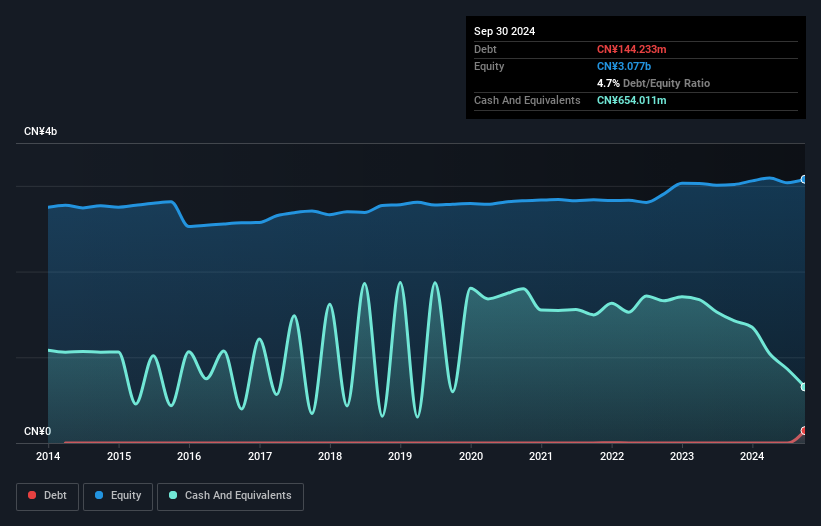- China
- /
- Real Estate
- /
- SZSE:000886
Despite Lacking Profits Hainan Expressway (SZSE:000886) Seems To Be On Top Of Its Debt
Legendary fund manager Li Lu (who Charlie Munger backed) once said, 'The biggest investment risk is not the volatility of prices, but whether you will suffer a permanent loss of capital.' When we think about how risky a company is, we always like to look at its use of debt, since debt overload can lead to ruin. We note that Hainan Expressway Co., Ltd. (SZSE:000886) does have debt on its balance sheet. But is this debt a concern to shareholders?
When Is Debt A Problem?
Debt assists a business until the business has trouble paying it off, either with new capital or with free cash flow. If things get really bad, the lenders can take control of the business. While that is not too common, we often do see indebted companies permanently diluting shareholders because lenders force them to raise capital at a distressed price. Of course, debt can be an important tool in businesses, particularly capital heavy businesses. The first step when considering a company's debt levels is to consider its cash and debt together.
See our latest analysis for Hainan Expressway
What Is Hainan Expressway's Net Debt?
The image below, which you can click on for greater detail, shows that at September 2024 Hainan Expressway had debt of CN¥144.2m, up from none in one year. However, its balance sheet shows it holds CN¥654.0m in cash, so it actually has CN¥509.8m net cash.

How Strong Is Hainan Expressway's Balance Sheet?
We can see from the most recent balance sheet that Hainan Expressway had liabilities of CN¥283.1m falling due within a year, and liabilities of CN¥165.4m due beyond that. On the other hand, it had cash of CN¥654.0m and CN¥193.5m worth of receivables due within a year. So it can boast CN¥399.0m more liquid assets than total liabilities.
This surplus suggests that Hainan Expressway has a conservative balance sheet, and could probably eliminate its debt without much difficulty. Simply put, the fact that Hainan Expressway has more cash than debt is arguably a good indication that it can manage its debt safely. When analysing debt levels, the balance sheet is the obvious place to start. But you can't view debt in total isolation; since Hainan Expressway will need earnings to service that debt. So if you're keen to discover more about its earnings, it might be worth checking out this graph of its long term earnings trend.
Over 12 months, Hainan Expressway reported revenue of CN¥198m, which is a gain of 70%, although it did not report any earnings before interest and tax. With any luck the company will be able to grow its way to profitability.
So How Risky Is Hainan Expressway?
Although Hainan Expressway had an earnings before interest and tax (EBIT) loss over the last twelve months, it made a statutory profit of CN¥84m. So taking that on face value, and considering the cash, we don't think its very risky in the near term. We think its revenue growth of 70% is a good sign. We'd see further strong growth as an optimistic indication. There's no doubt that we learn most about debt from the balance sheet. However, not all investment risk resides within the balance sheet - far from it. Be aware that Hainan Expressway is showing 3 warning signs in our investment analysis , and 1 of those shouldn't be ignored...
If you're interested in investing in businesses that can grow profits without the burden of debt, then check out this free list of growing businesses that have net cash on the balance sheet.
Valuation is complex, but we're here to simplify it.
Discover if Hainan Expressway might be undervalued or overvalued with our detailed analysis, featuring fair value estimates, potential risks, dividends, insider trades, and its financial condition.
Access Free AnalysisHave feedback on this article? Concerned about the content? Get in touch with us directly. Alternatively, email editorial-team (at) simplywallst.com.
This article by Simply Wall St is general in nature. We provide commentary based on historical data and analyst forecasts only using an unbiased methodology and our articles are not intended to be financial advice. It does not constitute a recommendation to buy or sell any stock, and does not take account of your objectives, or your financial situation. We aim to bring you long-term focused analysis driven by fundamental data. Note that our analysis may not factor in the latest price-sensitive company announcements or qualitative material. Simply Wall St has no position in any stocks mentioned.
About SZSE:000886
Hainan Expressway
Engages in the transportation, real estate development, cultural tourism, and other businesses in China.
Mediocre balance sheet with low risk.
Market Insights
Community Narratives



